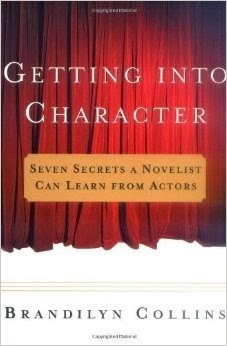Edie Melson's Blog, page 427
December 12, 2013
During This Season of Giving—Give Yourself the Gift of Time to Write
Today’s the last day to help The Write Conversation be one of the Top 10 Blogs for Writers . The more nominations we get, the higher our score, so after you finish reading, hop over to Write to Done and share why you love The Write Conversation.
Give Yourself the Gift of Time to Write
by Edie Melson
 We writers are an odd lot.
We writers are an odd lot.
We’re driven to write, spending time composing poetry, writing books, researching articles. We doodle titles, character names, and plot ideas on scraps of paper. All the while feeling guilty about the time we spend pursuing our dream. I call it writer's guilt.
Everyone of us has felt the tug. it’s all part and parcel when you work at home.
I’ve fought the battle for years—sometimes more successfully than others. And the craziest thing is the guilt is pretty much self imposed. My family is frequently more supportive of my writing time than I am.
 So how have I solved this dilemma?
So how have I solved this dilemma?
Years ago I made a conscious decision to give myself permission to make writing a priority. I gave myself the gift of time to write. Sometimes it would have been easier to avoid the blank page and not risk the failure. But I refused to cave into the fear.
Has it been worth it?
You bet it has! Not only have I gotten farther along with my goals and dreams, but it’s given me a self-confidence I didn’t expect. The more I make writing a priority, the better I get at it. Then the more success I have, which leads to the courage to push myself and reach for the stars.
Here are the steps I took to set aside time for writing:
 1. Come up with a schedule and keep regular, consistent hours. Notice I said regular hours—not normal ones. For years I wrote with young children. That meant writing in the afternoons and after they were in bed. Just because you’re working odd hours doesn’t mean you can’t have a schedule.
1. Come up with a schedule and keep regular, consistent hours. Notice I said regular hours—not normal ones. For years I wrote with young children. That meant writing in the afternoons and after they were in bed. Just because you’re working odd hours doesn’t mean you can’t have a schedule.
2. Respect your dream. If your best friend, or child had a dream you’d encourage them to pursue it. Give yourself the same support that you’d give someone else. Trust me, you’re worth it!
3. Be consistent.If you’re not accepting calls from your mother-in-law because you’re working, don’t spend the afternoon on the phone with your best friend. Stay focused on your writing. This is even more critical if your time is at a premium.
4. Recruit a support team. Instead of adversaries, enlist your friends and family to help you reach your writing goals. Communicate those goals, clearly and frequently. Ask for their help to reach them. After all, what mother doesn’t want to help her baby succeed!
5. Share your victories. Let those that help you share in the joy of goals accomplished and milestones reached.
What do you do to make your writing time a priority? What interruptions do you struggle with the most? Share your thoughts and we’ll all support each other.
Don’t forget to join the conversation!Blessings,
Edie
Tweetables:During This Season of Giving—Give Yourself the Gift of Time to Write! (Click to Tweet)
Have you given yourself a gift this Christmas? Give yourself time to write! (Click to Tweet)
Give Yourself the Gift of Time to Write
by Edie Melson
 We writers are an odd lot.
We writers are an odd lot. We’re driven to write, spending time composing poetry, writing books, researching articles. We doodle titles, character names, and plot ideas on scraps of paper. All the while feeling guilty about the time we spend pursuing our dream. I call it writer's guilt.
Everyone of us has felt the tug. it’s all part and parcel when you work at home.
I’ve fought the battle for years—sometimes more successfully than others. And the craziest thing is the guilt is pretty much self imposed. My family is frequently more supportive of my writing time than I am.
 So how have I solved this dilemma?
So how have I solved this dilemma? Years ago I made a conscious decision to give myself permission to make writing a priority. I gave myself the gift of time to write. Sometimes it would have been easier to avoid the blank page and not risk the failure. But I refused to cave into the fear.
Has it been worth it?
You bet it has! Not only have I gotten farther along with my goals and dreams, but it’s given me a self-confidence I didn’t expect. The more I make writing a priority, the better I get at it. Then the more success I have, which leads to the courage to push myself and reach for the stars.
Here are the steps I took to set aside time for writing:
 1. Come up with a schedule and keep regular, consistent hours. Notice I said regular hours—not normal ones. For years I wrote with young children. That meant writing in the afternoons and after they were in bed. Just because you’re working odd hours doesn’t mean you can’t have a schedule.
1. Come up with a schedule and keep regular, consistent hours. Notice I said regular hours—not normal ones. For years I wrote with young children. That meant writing in the afternoons and after they were in bed. Just because you’re working odd hours doesn’t mean you can’t have a schedule.2. Respect your dream. If your best friend, or child had a dream you’d encourage them to pursue it. Give yourself the same support that you’d give someone else. Trust me, you’re worth it!
3. Be consistent.If you’re not accepting calls from your mother-in-law because you’re working, don’t spend the afternoon on the phone with your best friend. Stay focused on your writing. This is even more critical if your time is at a premium.
4. Recruit a support team. Instead of adversaries, enlist your friends and family to help you reach your writing goals. Communicate those goals, clearly and frequently. Ask for their help to reach them. After all, what mother doesn’t want to help her baby succeed!
5. Share your victories. Let those that help you share in the joy of goals accomplished and milestones reached.
What do you do to make your writing time a priority? What interruptions do you struggle with the most? Share your thoughts and we’ll all support each other.
Don’t forget to join the conversation!Blessings,
Edie
Tweetables:During This Season of Giving—Give Yourself the Gift of Time to Write! (Click to Tweet)
Have you given yourself a gift this Christmas? Give yourself time to write! (Click to Tweet)
Published on December 12, 2013 01:00
December 10, 2013
Top 10 Things I Learned About being a Writer from Rudolf the Red-Nosed Reindeer
by Edie Melson
 I always struggle with blogging balance around the holidays.I want to join in the fun, but I get a little tired of all the non-writing posts I read everywhere. Today I want to share my version of a compromise—Top 10 Things I Learned About being a Writer From Rudolf the Red-Nosed Reindeer.
I always struggle with blogging balance around the holidays.I want to join in the fun, but I get a little tired of all the non-writing posts I read everywhere. Today I want to share my version of a compromise—Top 10 Things I Learned About being a Writer From Rudolf the Red-Nosed Reindeer.
I love all the Christmas specials that come around every year during the holidays, and Rudolph the Red-Nosed Reindeer has always been one of my favorites. I identify with his lack of self-confidence, his heart for his friends and especially his gumption when Santa called on him to step up and guide the sleigh that night.
And it occurs to me that, as writers, there are a lot of valuable lessons in this holiday tale.
Here are the TOP 10 lessons I’ve learned:
 10. We’re all born with a special gift.
10. We’re all born with a special gift.
9. At some point we all feel like that special gift is a curse.
8. Hiding who we really are are brings out the bullies and naysayers.
7. We all need time to mature into our gift.
6. Trying to live up to the image of who others think we should be won’t bring anything but trouble and heartache.
 5. True friends will see beyond our differences and embrace the essence of who we are.
5. True friends will see beyond our differences and embrace the essence of who we are.
4. We’re given that special gift for a reason and a purpose.
3. Running away from who we are doesn’t ever solve anything.
2. There will come a time when you have to decide to work within your gift, not around it.
And the best lesson of all . . . 1. Being who God meant you to be will bless others as much as you.
1. Being who God meant you to be will bless others as much as you.
How about you? Care to share something you’ve learned from an unlikely source? Be sure to share your thoughts below in the comments section.
Don’t forget to join the conversation!Blessings,Edie
Tweetables
Valuable lessons about being a writer from Rudolph theRed-nosed Reindeer. (Click to Tweet)
Hiding our gifts always brings out the bullies & naysayers, & other lessons learned from Rudolph. (Click to Tweet)
 I always struggle with blogging balance around the holidays.I want to join in the fun, but I get a little tired of all the non-writing posts I read everywhere. Today I want to share my version of a compromise—Top 10 Things I Learned About being a Writer From Rudolf the Red-Nosed Reindeer.
I always struggle with blogging balance around the holidays.I want to join in the fun, but I get a little tired of all the non-writing posts I read everywhere. Today I want to share my version of a compromise—Top 10 Things I Learned About being a Writer From Rudolf the Red-Nosed Reindeer.I love all the Christmas specials that come around every year during the holidays, and Rudolph the Red-Nosed Reindeer has always been one of my favorites. I identify with his lack of self-confidence, his heart for his friends and especially his gumption when Santa called on him to step up and guide the sleigh that night.
And it occurs to me that, as writers, there are a lot of valuable lessons in this holiday tale.
Here are the TOP 10 lessons I’ve learned:
 10. We’re all born with a special gift.
10. We’re all born with a special gift. 9. At some point we all feel like that special gift is a curse.
8. Hiding who we really are are brings out the bullies and naysayers.
7. We all need time to mature into our gift.
6. Trying to live up to the image of who others think we should be won’t bring anything but trouble and heartache.
 5. True friends will see beyond our differences and embrace the essence of who we are.
5. True friends will see beyond our differences and embrace the essence of who we are.4. We’re given that special gift for a reason and a purpose.
3. Running away from who we are doesn’t ever solve anything.
2. There will come a time when you have to decide to work within your gift, not around it.
And the best lesson of all . . .
 1. Being who God meant you to be will bless others as much as you.
1. Being who God meant you to be will bless others as much as you.How about you? Care to share something you’ve learned from an unlikely source? Be sure to share your thoughts below in the comments section.
Don’t forget to join the conversation!Blessings,Edie
Tweetables
Valuable lessons about being a writer from Rudolph theRed-nosed Reindeer. (Click to Tweet)
Hiding our gifts always brings out the bullies & naysayers, & other lessons learned from Rudolph. (Click to Tweet)
Published on December 10, 2013 01:00
December 9, 2013
Social Media Monday—Add a LIKE Button to Your Personal Profile on Facebook
by Edie Melson
 There’s a movement away from the necessity of having a professional Facebook page. For those of you who have growing and active professional pages, this post does NOT affect you. Keep doing what works. But for those of us who haven’t had much success migrating our professional connections over from our personal profile it’s a gift from Heaven!
There’s a movement away from the necessity of having a professional Facebook page. For those of you who have growing and active professional pages, this post does NOT affect you. Keep doing what works. But for those of us who haven’t had much success migrating our professional connections over from our personal profile it’s a gift from Heaven!
Facebook now allows personal profiles to have FOLLOWERS as well as FRIENDS. This means we can utilize the success on our personal profiles in the professional world.
It’s easy to set this up and here’s how:Click on the Cog icon on the blue FB bar.Click on Account settings. (see screenshot below)
 Once you’re there, on the left column, click on FOLLOWERS.From the menu that appears, check the box for TURN ON FOLLOWERS.
Once you’re there, on the left column, click on FOLLOWERS.From the menu that appears, check the box for TURN ON FOLLOWERS.
IMPORTANT NOTE: You will NOT be able to see the follow box on your own profile. I know it’s stupid, but it just doesn’t appear. If you’re worried it’s not there, email a friend and ask them to double check. But as long as that box is checked you will have the follower option on your personal profile.
How it works: People will now have the option of sending you a FRIEND REQUEST or FOLLOWING you.
If someone sends you a friend request, and you don’t want to accept them as a friend you don’t have to do anything. Once you have the follower option enabled they will automatically become a follower. You don’t have to do anything.
SECOND IMPORTANT NOTE: Your followers will ONLY have access to the posts that you designate as public, not anything you share privately.
Changes You May Want to ConsiderIf you’re going to use your personal profile professionally, I recommend you designate your posts as public as the default setting. Here’s how to do that:Again click on the cog icon and Account settings.Once there, click on PRIVACY.Under WHO CAN SEE MY STUFF?, click on EDIT and choose PUBLIC. (see screenshot below)
 You always have the option to designate individual FB updates as PRIVATE. To do that, go to your timeline and compose an update. Click on the small arrow on the bottom of the update window and choose who you want to see the update. (see screenshot below)
You always have the option to designate individual FB updates as PRIVATE. To do that, go to your timeline and compose an update. Click on the small arrow on the bottom of the update window and choose who you want to see the update. (see screenshot below)
 People who are following you will be able to comment on your public posts, but they CANNOT post on your wall. Only your friends can post on your wall. If someone is following you and you don’t want them to, you’ll have to BLOCK them. I only do that with creepers and scary people.
People who are following you will be able to comment on your public posts, but they CANNOT post on your wall. Only your friends can post on your wall. If someone is following you and you don’t want them to, you’ll have to BLOCK them. I only do that with creepers and scary people.
Now it’s your turn. If you have any questions about Facebook, post them in the comments section below.
Don’t forget to join the conversation!Blessings,
Edie
Tweetables:Learn how to enable LIKES on your Facebook Personal Profile! (Click to Tweet)
Professional Facebook Page or Personal Profile? You can have the best of both! (Click to Tweet)
 There’s a movement away from the necessity of having a professional Facebook page. For those of you who have growing and active professional pages, this post does NOT affect you. Keep doing what works. But for those of us who haven’t had much success migrating our professional connections over from our personal profile it’s a gift from Heaven!
There’s a movement away from the necessity of having a professional Facebook page. For those of you who have growing and active professional pages, this post does NOT affect you. Keep doing what works. But for those of us who haven’t had much success migrating our professional connections over from our personal profile it’s a gift from Heaven!Facebook now allows personal profiles to have FOLLOWERS as well as FRIENDS. This means we can utilize the success on our personal profiles in the professional world.
It’s easy to set this up and here’s how:Click on the Cog icon on the blue FB bar.Click on Account settings. (see screenshot below)
 Once you’re there, on the left column, click on FOLLOWERS.From the menu that appears, check the box for TURN ON FOLLOWERS.
Once you’re there, on the left column, click on FOLLOWERS.From the menu that appears, check the box for TURN ON FOLLOWERS.IMPORTANT NOTE: You will NOT be able to see the follow box on your own profile. I know it’s stupid, but it just doesn’t appear. If you’re worried it’s not there, email a friend and ask them to double check. But as long as that box is checked you will have the follower option on your personal profile.
How it works: People will now have the option of sending you a FRIEND REQUEST or FOLLOWING you.
If someone sends you a friend request, and you don’t want to accept them as a friend you don’t have to do anything. Once you have the follower option enabled they will automatically become a follower. You don’t have to do anything.
SECOND IMPORTANT NOTE: Your followers will ONLY have access to the posts that you designate as public, not anything you share privately.
Changes You May Want to ConsiderIf you’re going to use your personal profile professionally, I recommend you designate your posts as public as the default setting. Here’s how to do that:Again click on the cog icon and Account settings.Once there, click on PRIVACY.Under WHO CAN SEE MY STUFF?, click on EDIT and choose PUBLIC. (see screenshot below)
 You always have the option to designate individual FB updates as PRIVATE. To do that, go to your timeline and compose an update. Click on the small arrow on the bottom of the update window and choose who you want to see the update. (see screenshot below)
You always have the option to designate individual FB updates as PRIVATE. To do that, go to your timeline and compose an update. Click on the small arrow on the bottom of the update window and choose who you want to see the update. (see screenshot below) People who are following you will be able to comment on your public posts, but they CANNOT post on your wall. Only your friends can post on your wall. If someone is following you and you don’t want them to, you’ll have to BLOCK them. I only do that with creepers and scary people.
People who are following you will be able to comment on your public posts, but they CANNOT post on your wall. Only your friends can post on your wall. If someone is following you and you don’t want them to, you’ll have to BLOCK them. I only do that with creepers and scary people.Now it’s your turn. If you have any questions about Facebook, post them in the comments section below.
Don’t forget to join the conversation!Blessings,
Edie
Tweetables:Learn how to enable LIKES on your Facebook Personal Profile! (Click to Tweet)
Professional Facebook Page or Personal Profile? You can have the best of both! (Click to Tweet)
Published on December 09, 2013 01:00
December 8, 2013
Weekend Worship—A Material Girl
Don’t worry and say, ‘What will we eat?’ or ‘What will we drink?’ or ‘What will we wear?’ The people who don’t know God keep trying to get these things, and your Father in heaven knows you need them. Matthew 6:31-32
 This holiday season is hard for me, but not for the reasons you may think. It’s because I am—in so many ways—a material girl. I worry about what I wear, what car I drive, even what I serve my family for supper.
This holiday season is hard for me, but not for the reasons you may think. It’s because I am—in so many ways—a material girl. I worry about what I wear, what car I drive, even what I serve my family for supper.
Everywhere I look during this time of year I’m inundated by the world’s confirmation that things matter. Sometimes the message is subtle, cloaked to look like I’m spending money so I can spend time. But no matter how it’s presented, the world wants me to spend money instead of time.
 Today I’m drawing a line in the sand. I’m not giving up without a fight. This season I’m concentrating on doing these three things:I find ways to spend more time in God’s Word.Opportunities to spend more time with friends.New ways to give my family the breathing space of time together.
Today I’m drawing a line in the sand. I’m not giving up without a fight. This season I’m concentrating on doing these three things:I find ways to spend more time in God’s Word.Opportunities to spend more time with friends.New ways to give my family the breathing space of time together.
All of these are a fight—and the world has some mighty powerful weapons.
Now I’m not saying we shouldn’t ever buy things—far from it. The Bible assures us that God wants to bless us, in many ways. But if I let God be one hundred percent in charge of what I spent my money on can you imagine the things (spiritual and physical) that would follow? I wouldn’t have to worry about what I ate or drank, because God would be in charge.I wouldn’t have to worry about what I wore or how I looked because that too, would be covered by God.I wouldn’t even have to worry about what to do next, because His priorities would guarantee that I would have time for everything important.
I wouldn’t have to worry about what I ate or drank, because God would be in charge.I wouldn’t have to worry about what I wore or how I looked because that too, would be covered by God.I wouldn’t even have to worry about what to do next, because His priorities would guarantee that I would have time for everything important.
So how about you? Here’s your invitation to join me and take back the joy of the holiday.
 This holiday season is hard for me, but not for the reasons you may think. It’s because I am—in so many ways—a material girl. I worry about what I wear, what car I drive, even what I serve my family for supper.
This holiday season is hard for me, but not for the reasons you may think. It’s because I am—in so many ways—a material girl. I worry about what I wear, what car I drive, even what I serve my family for supper. Everywhere I look during this time of year I’m inundated by the world’s confirmation that things matter. Sometimes the message is subtle, cloaked to look like I’m spending money so I can spend time. But no matter how it’s presented, the world wants me to spend money instead of time.
 Today I’m drawing a line in the sand. I’m not giving up without a fight. This season I’m concentrating on doing these three things:I find ways to spend more time in God’s Word.Opportunities to spend more time with friends.New ways to give my family the breathing space of time together.
Today I’m drawing a line in the sand. I’m not giving up without a fight. This season I’m concentrating on doing these three things:I find ways to spend more time in God’s Word.Opportunities to spend more time with friends.New ways to give my family the breathing space of time together. All of these are a fight—and the world has some mighty powerful weapons.
Now I’m not saying we shouldn’t ever buy things—far from it. The Bible assures us that God wants to bless us, in many ways. But if I let God be one hundred percent in charge of what I spent my money on can you imagine the things (spiritual and physical) that would follow?
 I wouldn’t have to worry about what I ate or drank, because God would be in charge.I wouldn’t have to worry about what I wore or how I looked because that too, would be covered by God.I wouldn’t even have to worry about what to do next, because His priorities would guarantee that I would have time for everything important.
I wouldn’t have to worry about what I ate or drank, because God would be in charge.I wouldn’t have to worry about what I wore or how I looked because that too, would be covered by God.I wouldn’t even have to worry about what to do next, because His priorities would guarantee that I would have time for everything important. So how about you? Here’s your invitation to join me and take back the joy of the holiday.
Published on December 08, 2013 01:00
December 7, 2013
Social Media Image—What Says Christmas to You?
What says Christmas most to you?
 "It is Christmas in the heart that puts Christmas in the air." W.T. EllisShare your thoughts in the comment section below.
"It is Christmas in the heart that puts Christmas in the air." W.T. EllisShare your thoughts in the comment section below.
I also invite you to use this image any way you like online. Post it to your blog, share it on Facebook, Twitter, Pinterest, anywhere you'd like. All I ask is that you keep it intact, with my website watermark visible.
Don't forget to join the conversation!Blessings,Edie
 "It is Christmas in the heart that puts Christmas in the air." W.T. EllisShare your thoughts in the comment section below.
"It is Christmas in the heart that puts Christmas in the air." W.T. EllisShare your thoughts in the comment section below. I also invite you to use this image any way you like online. Post it to your blog, share it on Facebook, Twitter, Pinterest, anywhere you'd like. All I ask is that you keep it intact, with my website watermark visible.
Don't forget to join the conversation!Blessings,Edie
Published on December 07, 2013 01:00
December 6, 2013
Life Lessons—Unexpected Storms
by Reba J. Hoffman, Ph.D
 Last Sunday, Edie shared the horrible scare she and her family faced when her youngest sonbroke his back. Now that’s something that will turn your world upside down!
Last Sunday, Edie shared the horrible scare she and her family faced when her youngest sonbroke his back. Now that’s something that will turn your world upside down!
I can imagine how it went. They were enjoying the night before Thanksgiving. Most likely they were sitting by the fire watching a favorite flick. I bet Edie was knitting as the scenes played out on the big screen TV.
Then the unexpected storm—and certainly something no parent ever wants to hear—came blowing in out of nowhere, fracturing her blissful evening and raining terror on her peaceful little world.
 Storms…
Storms…
I lived in Florida for over four decades and have ridden out my share of hurricanes. Did you know they are not the most destructive? Not by any means. We prepared for them. We know exactly how to prepare. We have our plywood labeled and we just secure them in place before the storm hits.
In the sunshine state, the most damage is done by the summer storms that pop up out of nowhere and blow through with gale force winds. They spawn tornados, dump tons of rain on the roadways and catch thousands of people unawares.
It’s those storms like Edie experienced the night before Thanksgiving that cause us to emotionally tumble end-over-end completely out of control in life.
The same can be true for your writer’s life. Powerful storms can rain down on you with a force that seemingly won’t ever let up. When that happens, there are some things you can do to help you weather the storm. Here are a few: Remember that it is temporary. As remedial as that seems, it’s usually the last thing we think of when the storm is raging.Draw on past experience. Don’t worry. You don’t have to start a think tank in the middle of an emergency. The wisdom is in you and it will bubble up exactly when you need for it to.Trust your instincts. Remember, God created you with creative brilliance. Even though it doesn’t seem like it during the storm, you really do have within you the ability to ride it out.Evacuate when necessary. There is no shame in abandoning and running for cover when conditions deteriorate. Evacuation is usually only temporary but, just like in a hurricane, running for cover places you at a safe distance away from the storm’s fury.
Remember that it is temporary. As remedial as that seems, it’s usually the last thing we think of when the storm is raging.Draw on past experience. Don’t worry. You don’t have to start a think tank in the middle of an emergency. The wisdom is in you and it will bubble up exactly when you need for it to.Trust your instincts. Remember, God created you with creative brilliance. Even though it doesn’t seem like it during the storm, you really do have within you the ability to ride it out.Evacuate when necessary. There is no shame in abandoning and running for cover when conditions deteriorate. Evacuation is usually only temporary but, just like in a hurricane, running for cover places you at a safe distance away from the storm’s fury.
Look, you won’t see those unexpected storms coming. But come they will and when they do, you’ll get through them. You’ll come out on the other side.
What was the last storm you faced in your writing? Or in life? How did you weather it? Share it here!
 Reba J. Hoffman is the founder and president of Magellan Life Coaching (www.magellanlifecoaching.com). She holds a Ph.D. in Clinical Counseling and is a natural encourager. She serves as Member Care Coach for My Book Therapy and is the author of Dare to Dream, A Writer’s Journal. You can connect with Reba through her motivational blog, Finding True North, or by email at reba@magellanlifecoaching.com. You can also follow her on Twitter at @MagellanCoach.
Reba J. Hoffman is the founder and president of Magellan Life Coaching (www.magellanlifecoaching.com). She holds a Ph.D. in Clinical Counseling and is a natural encourager. She serves as Member Care Coach for My Book Therapy and is the author of Dare to Dream, A Writer’s Journal. You can connect with Reba through her motivational blog, Finding True North, or by email at reba@magellanlifecoaching.com. You can also follow her on Twitter at @MagellanCoach.
 Last Sunday, Edie shared the horrible scare she and her family faced when her youngest sonbroke his back. Now that’s something that will turn your world upside down!
Last Sunday, Edie shared the horrible scare she and her family faced when her youngest sonbroke his back. Now that’s something that will turn your world upside down!I can imagine how it went. They were enjoying the night before Thanksgiving. Most likely they were sitting by the fire watching a favorite flick. I bet Edie was knitting as the scenes played out on the big screen TV.
Then the unexpected storm—and certainly something no parent ever wants to hear—came blowing in out of nowhere, fracturing her blissful evening and raining terror on her peaceful little world.
 Storms…
Storms…I lived in Florida for over four decades and have ridden out my share of hurricanes. Did you know they are not the most destructive? Not by any means. We prepared for them. We know exactly how to prepare. We have our plywood labeled and we just secure them in place before the storm hits.
In the sunshine state, the most damage is done by the summer storms that pop up out of nowhere and blow through with gale force winds. They spawn tornados, dump tons of rain on the roadways and catch thousands of people unawares.
It’s those storms like Edie experienced the night before Thanksgiving that cause us to emotionally tumble end-over-end completely out of control in life.
The same can be true for your writer’s life. Powerful storms can rain down on you with a force that seemingly won’t ever let up. When that happens, there are some things you can do to help you weather the storm. Here are a few:
 Remember that it is temporary. As remedial as that seems, it’s usually the last thing we think of when the storm is raging.Draw on past experience. Don’t worry. You don’t have to start a think tank in the middle of an emergency. The wisdom is in you and it will bubble up exactly when you need for it to.Trust your instincts. Remember, God created you with creative brilliance. Even though it doesn’t seem like it during the storm, you really do have within you the ability to ride it out.Evacuate when necessary. There is no shame in abandoning and running for cover when conditions deteriorate. Evacuation is usually only temporary but, just like in a hurricane, running for cover places you at a safe distance away from the storm’s fury.
Remember that it is temporary. As remedial as that seems, it’s usually the last thing we think of when the storm is raging.Draw on past experience. Don’t worry. You don’t have to start a think tank in the middle of an emergency. The wisdom is in you and it will bubble up exactly when you need for it to.Trust your instincts. Remember, God created you with creative brilliance. Even though it doesn’t seem like it during the storm, you really do have within you the ability to ride it out.Evacuate when necessary. There is no shame in abandoning and running for cover when conditions deteriorate. Evacuation is usually only temporary but, just like in a hurricane, running for cover places you at a safe distance away from the storm’s fury.Look, you won’t see those unexpected storms coming. But come they will and when they do, you’ll get through them. You’ll come out on the other side.
What was the last storm you faced in your writing? Or in life? How did you weather it? Share it here!
 Reba J. Hoffman is the founder and president of Magellan Life Coaching (www.magellanlifecoaching.com). She holds a Ph.D. in Clinical Counseling and is a natural encourager. She serves as Member Care Coach for My Book Therapy and is the author of Dare to Dream, A Writer’s Journal. You can connect with Reba through her motivational blog, Finding True North, or by email at reba@magellanlifecoaching.com. You can also follow her on Twitter at @MagellanCoach.
Reba J. Hoffman is the founder and president of Magellan Life Coaching (www.magellanlifecoaching.com). She holds a Ph.D. in Clinical Counseling and is a natural encourager. She serves as Member Care Coach for My Book Therapy and is the author of Dare to Dream, A Writer’s Journal. You can connect with Reba through her motivational blog, Finding True North, or by email at reba@magellanlifecoaching.com. You can also follow her on Twitter at @MagellanCoach.
Published on December 06, 2013 01:00
December 5, 2013
Thursday Review—Getting Into Character by Brandilyn Collins
A review by Lynn H. Blackburn
 I’m going to tell y’all something that I don’t make a habit of sharing. I wouldn’t even tell you, except, well, you’re writers.
I’m going to tell y’all something that I don’t make a habit of sharing. I wouldn’t even tell you, except, well, you’re writers.
So, I’m hoping you’ll get this.
Sometimes…
I stand in front of my mirror and act out my scenes.
Does anyone else do this? Anyone?
Here’s the thing . . . If you can’t fathom acting out your scenes, then you probably won’t love the advice from Brandilyn Collins in her book, Getting Into Character…Seven Secrets aNovelist Can Learn from Actors.
I’ll confess, she does not specifically recommend my method, but she does recommend talking to yourself, er, your characters. Out loud.
 All you nonfiction writers . . . go ahead and grab a paper bag. I know you’re about to hyperventilate.
All you nonfiction writers . . . go ahead and grab a paper bag. I know you’re about to hyperventilate.
In Getting Into Character , Brandilyn Collins takes seven approaches “method” actors use to develop their characters and adapts those approaches for novelists. There are chapters delving into the following secrets:PersonalizingAction ObjectivesSubtextingColoring PassionsInner RhythmRestraint and ControlEmotion Memory
Each chapter begins with the method actor’s technique, followed by the novelist’s adaptation. After exploring each secret in detail, she concludes each chapter with study samples—text from books you’ve probably read that highlight each technique and her own breakdown of how the author incorporated the methods into each scene.
 I’ve read a lot—A LOT—of books on writing. Most of the time, the material presented isn’t all that new to me. It may be presented in a fresh way or with a new approach that I find useful, but the basic information is similar.
I’ve read a lot—A LOT—of books on writing. Most of the time, the material presented isn’t all that new to me. It may be presented in a fresh way or with a new approach that I find useful, but the basic information is similar.
Not so with Getting Into Character . This book was full of ideas that were new to me and I can’t wait to put them into action.
So, how about you? Ever acted out a scene? Talked to a character? Want to give it a shot?
Don’t forget to join the conversation!
 Lynn Huggins Blackburn has been telling herself stories since she was five and finally started writing them down. She blogs about faith, family, and her writing journey on her blog Out of the Boat. Lynn is a member of the Jerry B. Jenkins Christian Writers Guild and the Word Weavers, Greenville. She lives in South Carolina where she hangs out with three lively children, one fabulous man, and a cast of imaginary characters who find their way onto the pages of her still unpublished novels. She drinks a lot of coffee.
Lynn Huggins Blackburn has been telling herself stories since she was five and finally started writing them down. She blogs about faith, family, and her writing journey on her blog Out of the Boat. Lynn is a member of the Jerry B. Jenkins Christian Writers Guild and the Word Weavers, Greenville. She lives in South Carolina where she hangs out with three lively children, one fabulous man, and a cast of imaginary characters who find their way onto the pages of her still unpublished novels. She drinks a lot of coffee.
 I’m going to tell y’all something that I don’t make a habit of sharing. I wouldn’t even tell you, except, well, you’re writers.
I’m going to tell y’all something that I don’t make a habit of sharing. I wouldn’t even tell you, except, well, you’re writers.So, I’m hoping you’ll get this.
Sometimes…
I stand in front of my mirror and act out my scenes.
Does anyone else do this? Anyone?
Here’s the thing . . . If you can’t fathom acting out your scenes, then you probably won’t love the advice from Brandilyn Collins in her book, Getting Into Character…Seven Secrets aNovelist Can Learn from Actors.
I’ll confess, she does not specifically recommend my method, but she does recommend talking to yourself, er, your characters. Out loud.
 All you nonfiction writers . . . go ahead and grab a paper bag. I know you’re about to hyperventilate.
All you nonfiction writers . . . go ahead and grab a paper bag. I know you’re about to hyperventilate. In Getting Into Character , Brandilyn Collins takes seven approaches “method” actors use to develop their characters and adapts those approaches for novelists. There are chapters delving into the following secrets:PersonalizingAction ObjectivesSubtextingColoring PassionsInner RhythmRestraint and ControlEmotion Memory
Each chapter begins with the method actor’s technique, followed by the novelist’s adaptation. After exploring each secret in detail, she concludes each chapter with study samples—text from books you’ve probably read that highlight each technique and her own breakdown of how the author incorporated the methods into each scene.
 I’ve read a lot—A LOT—of books on writing. Most of the time, the material presented isn’t all that new to me. It may be presented in a fresh way or with a new approach that I find useful, but the basic information is similar.
I’ve read a lot—A LOT—of books on writing. Most of the time, the material presented isn’t all that new to me. It may be presented in a fresh way or with a new approach that I find useful, but the basic information is similar.Not so with Getting Into Character . This book was full of ideas that were new to me and I can’t wait to put them into action.
So, how about you? Ever acted out a scene? Talked to a character? Want to give it a shot?
Don’t forget to join the conversation!
 Lynn Huggins Blackburn has been telling herself stories since she was five and finally started writing them down. She blogs about faith, family, and her writing journey on her blog Out of the Boat. Lynn is a member of the Jerry B. Jenkins Christian Writers Guild and the Word Weavers, Greenville. She lives in South Carolina where she hangs out with three lively children, one fabulous man, and a cast of imaginary characters who find their way onto the pages of her still unpublished novels. She drinks a lot of coffee.
Lynn Huggins Blackburn has been telling herself stories since she was five and finally started writing them down. She blogs about faith, family, and her writing journey on her blog Out of the Boat. Lynn is a member of the Jerry B. Jenkins Christian Writers Guild and the Word Weavers, Greenville. She lives in South Carolina where she hangs out with three lively children, one fabulous man, and a cast of imaginary characters who find their way onto the pages of her still unpublished novels. She drinks a lot of coffee.
Published on December 05, 2013 01:00
December 4, 2013
The Key to Writing Good Fiction—Put Your Reader to Sleep
by Edie Melson
 Yes, you read the title correctly.
Put your reader to sleep
.
Yes, you read the title correctly.
Put your reader to sleep
.
Okay, maybe not completely to sleep, but at least allow them to dream. What does dreaming have to do with writing? Everything. The dream I’m referring to is the fictional dream. If you’ve never heard the term before, don’t worry. I guarantee you know what I’m talking about. I think author, John Gardner says it best.
“What counts in conventional fiction must be the vividness and continuity of the fictional dream the words set off in the reader’s mind.”
A fictional dream occurs when the world in the story you’re reading becomes more real than the physical world around you. We’ve all be there at one time or another—transported into another time or another place by an author’s well crafted words.
This experience is one that we try to create for our readers. And it’s one of the biggest differences between a good book and a great one. So how do we create this dream world? We do it by paying attention. Notice where you are right now. Are there sounds? Smells? Even if you’re not overwhelmed by your setting I bet you’re aware of it. The same thing is true for our characters. If we've written them as three dimensional people then they should notice and be affected by what's around them. However, if we neglect those details, we deny our readers the chance to be transported.
 Even more important than what we do to put our readers to sleep is what we DON’T do. I think writers are far more often guilty of waking a reader up. We, as the author, have an obligation to
not
jolt our readers out of their fictional dream world.
Even more important than what we do to put our readers to sleep is what we DON’T do. I think writers are far more often guilty of waking a reader up. We, as the author, have an obligation to
not
jolt our readers out of their fictional dream world.
So what are some things we do that interrupt pleasant dreams?Bad Grammar—I’m not talking about a missed comma or two. I’m referring to sentence structure that’s difficult to read, modifiers that modify the wrong thing or even complicated punctuation. All of these things can cause a reader to stop and ponder what you’re trying to say. Once they stop you’ve lost them, they’re awake.Confusing Dialogue—This can include things like long sections of dialogue with no speaker tags or beats. If the reader has to go back and figure out who’s speaking it means you’ve either not put in enough tags or your characters don’t have unique enough voices to be identified. One word of caution, overuse of ‘said’ instead of interspersing with speaker beats can be just as jarring.Creative Speaker Tags—Anytime you use a speaker tag other than said or maybe asked you run the risk of making your reader stop. The word said is so common place in literature that it’s almost invisible. The reader skims lightly over it, uninterrupted. If, on the other hand, you pull out your thesaurus and try to find other words to use in its place you end up with jarring prose that tells the story through speaker tags instead of dialogue. Characters who don’t act right—I’m not referring to moral actions. We’ve all read stories where a character does something and we find ourselves shaking our heads. Know your characters well enough to keep them from acting out of character.Overwriting a dialect—I’m not against allowing your character to speak with an accent or in a dialect, but be careful how you do it. When the character is first introduced you can use a heavier hand with the spellings that denote dialect, such as learnin’ instead of learning. But after the reader gets to know the character they can hear the character speaking in their head and you don’t have to use spelling to convey their voice. In fact, if the reader has to work too hard to decipher your intent they will never even make it into the fictional dream.Head Hopping—This is when you switch POV (point of view) from one character to another without a good reason. The rule of thumb is that each scene should have a single POV character and that should be the character with the most at stake.
Characters who don’t act right—I’m not referring to moral actions. We’ve all read stories where a character does something and we find ourselves shaking our heads. Know your characters well enough to keep them from acting out of character.Overwriting a dialect—I’m not against allowing your character to speak with an accent or in a dialect, but be careful how you do it. When the character is first introduced you can use a heavier hand with the spellings that denote dialect, such as learnin’ instead of learning. But after the reader gets to know the character they can hear the character speaking in their head and you don’t have to use spelling to convey their voice. In fact, if the reader has to work too hard to decipher your intent they will never even make it into the fictional dream.Head Hopping—This is when you switch POV (point of view) from one character to another without a good reason. The rule of thumb is that each scene should have a single POV character and that should be the character with the most at stake.
The storyteller who can invite the reader into his world and make him believe it's real has captured the essence of what it means to be a great writer.
Now it's your turn. What jolts you out of the story world when you're reading?
And, don't forget to join the conversation!Blessings,
Edie
TweetablesWriting fiction? Put your reader to sleep—or at least leave them alone & let them dream! (Click to Tweet)
1 Thing you MUST do & 5 things to avoid when you're writing fiction (Click to Tweet)
 Yes, you read the title correctly.
Put your reader to sleep
.
Yes, you read the title correctly.
Put your reader to sleep
. Okay, maybe not completely to sleep, but at least allow them to dream. What does dreaming have to do with writing? Everything. The dream I’m referring to is the fictional dream. If you’ve never heard the term before, don’t worry. I guarantee you know what I’m talking about. I think author, John Gardner says it best.
“What counts in conventional fiction must be the vividness and continuity of the fictional dream the words set off in the reader’s mind.”
A fictional dream occurs when the world in the story you’re reading becomes more real than the physical world around you. We’ve all be there at one time or another—transported into another time or another place by an author’s well crafted words.
This experience is one that we try to create for our readers. And it’s one of the biggest differences between a good book and a great one. So how do we create this dream world? We do it by paying attention. Notice where you are right now. Are there sounds? Smells? Even if you’re not overwhelmed by your setting I bet you’re aware of it. The same thing is true for our characters. If we've written them as three dimensional people then they should notice and be affected by what's around them. However, if we neglect those details, we deny our readers the chance to be transported.
 Even more important than what we do to put our readers to sleep is what we DON’T do. I think writers are far more often guilty of waking a reader up. We, as the author, have an obligation to
not
jolt our readers out of their fictional dream world.
Even more important than what we do to put our readers to sleep is what we DON’T do. I think writers are far more often guilty of waking a reader up. We, as the author, have an obligation to
not
jolt our readers out of their fictional dream world. So what are some things we do that interrupt pleasant dreams?Bad Grammar—I’m not talking about a missed comma or two. I’m referring to sentence structure that’s difficult to read, modifiers that modify the wrong thing or even complicated punctuation. All of these things can cause a reader to stop and ponder what you’re trying to say. Once they stop you’ve lost them, they’re awake.Confusing Dialogue—This can include things like long sections of dialogue with no speaker tags or beats. If the reader has to go back and figure out who’s speaking it means you’ve either not put in enough tags or your characters don’t have unique enough voices to be identified. One word of caution, overuse of ‘said’ instead of interspersing with speaker beats can be just as jarring.Creative Speaker Tags—Anytime you use a speaker tag other than said or maybe asked you run the risk of making your reader stop. The word said is so common place in literature that it’s almost invisible. The reader skims lightly over it, uninterrupted. If, on the other hand, you pull out your thesaurus and try to find other words to use in its place you end up with jarring prose that tells the story through speaker tags instead of dialogue.
 Characters who don’t act right—I’m not referring to moral actions. We’ve all read stories where a character does something and we find ourselves shaking our heads. Know your characters well enough to keep them from acting out of character.Overwriting a dialect—I’m not against allowing your character to speak with an accent or in a dialect, but be careful how you do it. When the character is first introduced you can use a heavier hand with the spellings that denote dialect, such as learnin’ instead of learning. But after the reader gets to know the character they can hear the character speaking in their head and you don’t have to use spelling to convey their voice. In fact, if the reader has to work too hard to decipher your intent they will never even make it into the fictional dream.Head Hopping—This is when you switch POV (point of view) from one character to another without a good reason. The rule of thumb is that each scene should have a single POV character and that should be the character with the most at stake.
Characters who don’t act right—I’m not referring to moral actions. We’ve all read stories where a character does something and we find ourselves shaking our heads. Know your characters well enough to keep them from acting out of character.Overwriting a dialect—I’m not against allowing your character to speak with an accent or in a dialect, but be careful how you do it. When the character is first introduced you can use a heavier hand with the spellings that denote dialect, such as learnin’ instead of learning. But after the reader gets to know the character they can hear the character speaking in their head and you don’t have to use spelling to convey their voice. In fact, if the reader has to work too hard to decipher your intent they will never even make it into the fictional dream.Head Hopping—This is when you switch POV (point of view) from one character to another without a good reason. The rule of thumb is that each scene should have a single POV character and that should be the character with the most at stake.The storyteller who can invite the reader into his world and make him believe it's real has captured the essence of what it means to be a great writer.
Now it's your turn. What jolts you out of the story world when you're reading?
And, don't forget to join the conversation!Blessings,
Edie
TweetablesWriting fiction? Put your reader to sleep—or at least leave them alone & let them dream! (Click to Tweet)
1 Thing you MUST do & 5 things to avoid when you're writing fiction (Click to Tweet)
Published on December 04, 2013 03:43
December 3, 2013
You are Killing Yourself with a Weak (on nonexistent) Writer’s Bio—or Why a Writer's Bio is Essential
by Edie Melson
 You're killing yourself with a eek writer's bio!I’ve been accused of being blunt and forthright and I suppose the title of this post proves it’s true. But really people, don’t you realize how important those few lines at the end of a guest post or article really is? That space is valuable real estate and you’re growing weeds on it.
You're killing yourself with a eek writer's bio!I’ve been accused of being blunt and forthright and I suppose the title of this post proves it’s true. But really people, don’t you realize how important those few lines at the end of a guest post or article really is? That space is valuable real estate and you’re growing weeds on it.
I’ll say it again, you are killing yourself with a weak writer’s bio.
What a Bio NOT Supposed to do:Let me share what a writer’s bio is NOT designed to do. It’s not there to make me want to become your best friend. Sure I want enough info so I know you’re a real person, but my time (and everyone else’s) is in short supple, so don’t make me wade through folksy humor to get to what I need. If I want to get to know you better I’ll look up your blog and follow you on social media. Why bother with a writer's bio at the
Why bother with a writer's bio at the
end of an article or guest blog post?What a Bio IS Supposed to do:There are several reasons to have a writer’s bio ( and several sizes you need—but more on that later).
1. Because people are curious and suspicious. If I’m going to read something online, I at least want to know who wrote it. I’m leery of articles that don’t have an author. Is it computer generated (yes they can do that), is it stolen (happens all the time), is the author ashamed of having written it?
2. Because I may like what you have to say and want to read more. If what you’ve written resonates with me, I’m going to want to go deeper. No bio either means a dead-end (if I’m busy) or a lot of extra sleuthing on the Internet. Trust me when I say this, a lot of you are NOT easy to find—but that’s another post.
3. Because I want to share the post through social media. I know I CAN share it even if there’s no bio or attribution, but then my followers run into #1 and #2 above . . . and they complain to me. I’ve worked hard to build a strong online community, so I refuse to send out things that will knowingly frustrate them.
What You Have to Have Remember, you're spending all this
Remember, you're spending all this
time online to be FOUND!1. Links. You want to be found, by readers, by friends, by other writers. That’s hard to do when you don’t at least leave us a trail of breadcrumbs. Here are the links you need:Blog/websiteFacebookTwitter
These are the bare minimum. Of course if you don’t have these three, then you need to read my post on Gaining Traction with Social Media instead of Spinning Your Wheels.
2. A sentence or two about your credibility. For me it’s a quick line about how long I’ve been in the industry and how many books I have.
That’s it. You probably thought you needed all sorts of things, but you don’t. Now you’re probably wondering how you organize all this information and I’ve got you covered there, too.
Compose Your Bio: Your bio needs to be crafted with then end results in mind.It’s important to remember a bio isn’t a resume. It’s not necessary to include information that isn’t relevant to what you’re writing. So the first thing is . . .
Your bio needs to be crafted with then end results in mind.It’s important to remember a bio isn’t a resume. It’s not necessary to include information that isn’t relevant to what you’re writing. So the first thing is . . .
1. Keep it Relevant: For example, if you’re not writing about how to sell something, it isn’t important to mention your job 15 years ago as an outside sales person. Think relevant when you’re composing your bio.
2. Organize it with the important stuff up front. I know our families are important to us, that’s not what I mean. This is a business and although I’m happy to learn you have a successful marriage, that’s not the first thing I need to know. So start with your credibility, then move into how I find you and your books.
3. Include EMBEDDED hyperlinks when you send a bio to someone else to post. Don’t type out the full URLs, but actually embed the link to the words BLOG, TWITTER and FACEBOOK, as well as any others that are relevant. The reason you want to have the words already linked is because of the word count guidelines you’ll run into. You don’t want to waste your word count on a hyperlink—especially if you only have 20-25 words.
If you’re not sure how to insert links into a word document (or anywhere else) here’s a post on EverythingYou Need to Know about Hyperlinks .
How Many Bios Do I Really Need? You need several bios of different lengths, and they
You need several bios of different lengths, and they
need to be kept up-to-date.In a word, several. Depending on the guidelines of where you’re submitting it could be as small as 20-25 words or as long as several paragraphs. I try to keep several CURRENT versions of my bio in a file, easy to access.
Here are some examples:25 word bio:Edie Melson is an author, freelance writer and editor with years of experience. Connect with her on her blog – TheWrite Conversation, Twitter or Facebook.
50 word bio:Edie’s an author, freelance writer and editor. She’s the co-director of the Blue RidgeMountains Christian Writers Conference , Social Media Mentor at My Book Therapy , and Social Media Director for Southern Writer’s Magazine , as well as the Senior Editor for Novel Rocket . Visit her on her blog , Twitter , and Facebook .
100 word bio: Edie Melson is the author of four books, with two more due out January 2013. Her popular blog, The Write Conversation , reaches thousands of writers each month, and she’s the co-director of the Blue Ridge Mountains Christian WritersConference . Her bestselling ebook on social media has just been updated and re-released as Connections:Social Media & Networking Techniques for Writers. She’s the Social Media Mentor at My Book Therapy and the social media director for Southern Writers Magazine . She’s also the Senior Editor at NovelRocket . You can connect with Edie through Twitter and Facebook .
150 word bio:Edie Melson is the author of four books, with two more due out January 2014. As a respected freelance writer and editor with years of experience in the publishing industry, she’s connected with writers and readers throughout the country. Her bestselling ebook on social media has just been re-released asConnections: Social Media and Networking Techniques for Writers . Her popular writing blog, The Write Conversation, gives her the opportunity to share what she’s learned and mentor others. She’s the co-director of the BlueRidge Mountains Christian Writers Conference, as well as a popular faculty member at numerous others. She’s also the Social Media Mentor for My Book Therapy, the Social Media Director for Southern Writers Magazine, and the Senior Editor for NovelRocket. Be sure to connect with her through Twitter and Facebook.
300 word bio:Edie Melson is a leading professional in the writing industry. She’s a sought after writing instructor; and her heart to help others define and reach their dreams has connected her with writers all over the country. She’s the co-director of the Blue Ridge MountainsChristian Writers Conference, as well as a popular faculty member at numerous others.
She’s a prolific writer, publishing thousands of articles over the years, and has a popular writing blog, The WriteConversation. Edie is a regular contributor on the popular Novel Rocket and Inspire a Fire websites, as well as social media director for Southern Writers Magazine.
In keeping up with the leading edge of all things digital Edie has become known as one of the go-to experts on Twitter, Facebook, and social media for writers wanting to learn how to plug in. Her bestselling eBook on this subject, has recently been updated and expanded and re-released as Connections:Social Media and Networking Techniques for Writers.
Fighting Fear, Winning theWar at Home When Your Soldier Leaves for Battle , is Edie’s heart project. This devotional book for those with family members in the military debuted on Veterans Day, 2011. Look for her two newest books for military families debuting in January 2014: While My Son Serves and While My Husband Serves.
She’s a member of numerous civic and professional organizations, including Blue Star Mothers, the Advanced Writers and Speakers Association, The Christian Pen, and American Christian Fiction Writers. She’s also the Social Media Mentor for My Book Therapy, the Social Media Director for Southern Writers Magazine, and the Senior Editor for NovelRocket.com.
Edie has been married to high school sweetheart, Kirk, for 30+ years and they’ve raised three sons. You can also connect with Edie on Twitterand Facebook.
I think you get the picture, and now it’s your turn. What questions do you have about a writer’s bio? Share them in the comments section below.
Don’t forget to join the conversation!Blessings,
Edie
TweetablesYour writer's bio is an important piece of real estate—are you just using it to grow weeds instead of followers? (Click to Tweet)
Are you killing yourself with a weak (or nonexistent) writer's bio? (Click to Tweet)
 You're killing yourself with a eek writer's bio!I’ve been accused of being blunt and forthright and I suppose the title of this post proves it’s true. But really people, don’t you realize how important those few lines at the end of a guest post or article really is? That space is valuable real estate and you’re growing weeds on it.
You're killing yourself with a eek writer's bio!I’ve been accused of being blunt and forthright and I suppose the title of this post proves it’s true. But really people, don’t you realize how important those few lines at the end of a guest post or article really is? That space is valuable real estate and you’re growing weeds on it.I’ll say it again, you are killing yourself with a weak writer’s bio.
What a Bio NOT Supposed to do:Let me share what a writer’s bio is NOT designed to do. It’s not there to make me want to become your best friend. Sure I want enough info so I know you’re a real person, but my time (and everyone else’s) is in short supple, so don’t make me wade through folksy humor to get to what I need. If I want to get to know you better I’ll look up your blog and follow you on social media.
 Why bother with a writer's bio at the
Why bother with a writer's bio at the end of an article or guest blog post?What a Bio IS Supposed to do:There are several reasons to have a writer’s bio ( and several sizes you need—but more on that later).
1. Because people are curious and suspicious. If I’m going to read something online, I at least want to know who wrote it. I’m leery of articles that don’t have an author. Is it computer generated (yes they can do that), is it stolen (happens all the time), is the author ashamed of having written it?
2. Because I may like what you have to say and want to read more. If what you’ve written resonates with me, I’m going to want to go deeper. No bio either means a dead-end (if I’m busy) or a lot of extra sleuthing on the Internet. Trust me when I say this, a lot of you are NOT easy to find—but that’s another post.
3. Because I want to share the post through social media. I know I CAN share it even if there’s no bio or attribution, but then my followers run into #1 and #2 above . . . and they complain to me. I’ve worked hard to build a strong online community, so I refuse to send out things that will knowingly frustrate them.
What You Have to Have
 Remember, you're spending all this
Remember, you're spending all this time online to be FOUND!1. Links. You want to be found, by readers, by friends, by other writers. That’s hard to do when you don’t at least leave us a trail of breadcrumbs. Here are the links you need:Blog/websiteFacebookTwitter
These are the bare minimum. Of course if you don’t have these three, then you need to read my post on Gaining Traction with Social Media instead of Spinning Your Wheels.
2. A sentence or two about your credibility. For me it’s a quick line about how long I’ve been in the industry and how many books I have.
That’s it. You probably thought you needed all sorts of things, but you don’t. Now you’re probably wondering how you organize all this information and I’ve got you covered there, too.
Compose Your Bio:
 Your bio needs to be crafted with then end results in mind.It’s important to remember a bio isn’t a resume. It’s not necessary to include information that isn’t relevant to what you’re writing. So the first thing is . . .
Your bio needs to be crafted with then end results in mind.It’s important to remember a bio isn’t a resume. It’s not necessary to include information that isn’t relevant to what you’re writing. So the first thing is . . . 1. Keep it Relevant: For example, if you’re not writing about how to sell something, it isn’t important to mention your job 15 years ago as an outside sales person. Think relevant when you’re composing your bio.
2. Organize it with the important stuff up front. I know our families are important to us, that’s not what I mean. This is a business and although I’m happy to learn you have a successful marriage, that’s not the first thing I need to know. So start with your credibility, then move into how I find you and your books.
3. Include EMBEDDED hyperlinks when you send a bio to someone else to post. Don’t type out the full URLs, but actually embed the link to the words BLOG, TWITTER and FACEBOOK, as well as any others that are relevant. The reason you want to have the words already linked is because of the word count guidelines you’ll run into. You don’t want to waste your word count on a hyperlink—especially if you only have 20-25 words.
If you’re not sure how to insert links into a word document (or anywhere else) here’s a post on EverythingYou Need to Know about Hyperlinks .
How Many Bios Do I Really Need?
 You need several bios of different lengths, and they
You need several bios of different lengths, and theyneed to be kept up-to-date.In a word, several. Depending on the guidelines of where you’re submitting it could be as small as 20-25 words or as long as several paragraphs. I try to keep several CURRENT versions of my bio in a file, easy to access.
Here are some examples:25 word bio:Edie Melson is an author, freelance writer and editor with years of experience. Connect with her on her blog – TheWrite Conversation, Twitter or Facebook.
50 word bio:Edie’s an author, freelance writer and editor. She’s the co-director of the Blue RidgeMountains Christian Writers Conference , Social Media Mentor at My Book Therapy , and Social Media Director for Southern Writer’s Magazine , as well as the Senior Editor for Novel Rocket . Visit her on her blog , Twitter , and Facebook .
100 word bio: Edie Melson is the author of four books, with two more due out January 2013. Her popular blog, The Write Conversation , reaches thousands of writers each month, and she’s the co-director of the Blue Ridge Mountains Christian WritersConference . Her bestselling ebook on social media has just been updated and re-released as Connections:Social Media & Networking Techniques for Writers. She’s the Social Media Mentor at My Book Therapy and the social media director for Southern Writers Magazine . She’s also the Senior Editor at NovelRocket . You can connect with Edie through Twitter and Facebook .
150 word bio:Edie Melson is the author of four books, with two more due out January 2014. As a respected freelance writer and editor with years of experience in the publishing industry, she’s connected with writers and readers throughout the country. Her bestselling ebook on social media has just been re-released asConnections: Social Media and Networking Techniques for Writers . Her popular writing blog, The Write Conversation, gives her the opportunity to share what she’s learned and mentor others. She’s the co-director of the BlueRidge Mountains Christian Writers Conference, as well as a popular faculty member at numerous others. She’s also the Social Media Mentor for My Book Therapy, the Social Media Director for Southern Writers Magazine, and the Senior Editor for NovelRocket. Be sure to connect with her through Twitter and Facebook.
300 word bio:Edie Melson is a leading professional in the writing industry. She’s a sought after writing instructor; and her heart to help others define and reach their dreams has connected her with writers all over the country. She’s the co-director of the Blue Ridge MountainsChristian Writers Conference, as well as a popular faculty member at numerous others.
She’s a prolific writer, publishing thousands of articles over the years, and has a popular writing blog, The WriteConversation. Edie is a regular contributor on the popular Novel Rocket and Inspire a Fire websites, as well as social media director for Southern Writers Magazine.
In keeping up with the leading edge of all things digital Edie has become known as one of the go-to experts on Twitter, Facebook, and social media for writers wanting to learn how to plug in. Her bestselling eBook on this subject, has recently been updated and expanded and re-released as Connections:Social Media and Networking Techniques for Writers.
Fighting Fear, Winning theWar at Home When Your Soldier Leaves for Battle , is Edie’s heart project. This devotional book for those with family members in the military debuted on Veterans Day, 2011. Look for her two newest books for military families debuting in January 2014: While My Son Serves and While My Husband Serves.
She’s a member of numerous civic and professional organizations, including Blue Star Mothers, the Advanced Writers and Speakers Association, The Christian Pen, and American Christian Fiction Writers. She’s also the Social Media Mentor for My Book Therapy, the Social Media Director for Southern Writers Magazine, and the Senior Editor for NovelRocket.com.
Edie has been married to high school sweetheart, Kirk, for 30+ years and they’ve raised three sons. You can also connect with Edie on Twitterand Facebook.
I think you get the picture, and now it’s your turn. What questions do you have about a writer’s bio? Share them in the comments section below.
Don’t forget to join the conversation!Blessings,
Edie
TweetablesYour writer's bio is an important piece of real estate—are you just using it to grow weeds instead of followers? (Click to Tweet)
Are you killing yourself with a weak (or nonexistent) writer's bio? (Click to Tweet)
Published on December 03, 2013 01:00
December 2, 2013
Social Media Monday—Top 7 Mistakes Authors Make Online
by Edie Melson
 I travel all over the country, training writers how to utilize social media and blogging to grow their readership base.
I travel all over the country, training writers how to utilize social media and blogging to grow their readership base.
And I find the same mistakes over and over again.
These things are easily fixed, they’re generally small and often overlooked. Today I’m sharing the top 7 mistakes authors make online.
 1. Targeting the wrong audience. Unless you are publishing How to Write books, the audience you’re shooting for isn’t writers. Having a blog about how to write, or sharing updates for writers isn’t getting you in front of your readers.
1. Targeting the wrong audience. Unless you are publishing How to Write books, the audience you’re shooting for isn’t writers. Having a blog about how to write, or sharing updates for writers isn’t getting you in front of your readers.
2. Not defining your audience. Along the line of number one, you need to figure out who your audience is. It’s hard to reach people when you don’t know who they are or where to find them.
 3. Treating social media as an hard-sell advertising medium. Social media has the possibility of reaching millions, but it’s not a tool for direct selling. Quite the contrary. Direct, repeated pleas to, “buy my book” will drive potential readers far away.
3. Treating social media as an hard-sell advertising medium. Social media has the possibility of reaching millions, but it’s not a tool for direct selling. Quite the contrary. Direct, repeated pleas to, “buy my book” will drive potential readers far away.
4. Giving up too soon. Social media isn’t a get rich quick scheme. It takes time and effort. Don’t expect instant results, but keep moving forward.
5. Inconsistency. A lot of writers I talk to don’t make building a solid online presence a priority. It’s something that happens when they have time. Because of that they see little growth paired with a lot of frustration. Like anything else, building an online presence takes time and consistency.
 6. Trying to do too much. Along with the inconsistency, I often see writers jumping on every new social media platform that comes along. The truth is, we can only do so much. Pick what you’re good at, stick with what works, and give it time.
6. Trying to do too much. Along with the inconsistency, I often see writers jumping on every new social media platform that comes along. The truth is, we can only do so much. Pick what you’re good at, stick with what works, and give it time.
7. Not doing anything. Social media is overwhelming. I often share that if you don’t feel overwhelmed then you’re not doing it right. It’s a funny line, but there’s a lot of truth in it. But don’t let fear keep you from trying. There are so many rewards to building online friendships.
Now it’s your turn. What mistakes do you see writers making online? Have you made a few yourself? We can all learn from each other.
Don’t forget to join the conversation!Blessings,
Edie
TweetablesHave you made one of these Top 7 Mistakes Online? (Click to Tweet)
Make social media work for you by avoiding the top 7 mistakes authors make online! (Click to Tweet)
 I travel all over the country, training writers how to utilize social media and blogging to grow their readership base.
I travel all over the country, training writers how to utilize social media and blogging to grow their readership base.And I find the same mistakes over and over again.
These things are easily fixed, they’re generally small and often overlooked. Today I’m sharing the top 7 mistakes authors make online.
 1. Targeting the wrong audience. Unless you are publishing How to Write books, the audience you’re shooting for isn’t writers. Having a blog about how to write, or sharing updates for writers isn’t getting you in front of your readers.
1. Targeting the wrong audience. Unless you are publishing How to Write books, the audience you’re shooting for isn’t writers. Having a blog about how to write, or sharing updates for writers isn’t getting you in front of your readers.2. Not defining your audience. Along the line of number one, you need to figure out who your audience is. It’s hard to reach people when you don’t know who they are or where to find them.
 3. Treating social media as an hard-sell advertising medium. Social media has the possibility of reaching millions, but it’s not a tool for direct selling. Quite the contrary. Direct, repeated pleas to, “buy my book” will drive potential readers far away.
3. Treating social media as an hard-sell advertising medium. Social media has the possibility of reaching millions, but it’s not a tool for direct selling. Quite the contrary. Direct, repeated pleas to, “buy my book” will drive potential readers far away.4. Giving up too soon. Social media isn’t a get rich quick scheme. It takes time and effort. Don’t expect instant results, but keep moving forward.
5. Inconsistency. A lot of writers I talk to don’t make building a solid online presence a priority. It’s something that happens when they have time. Because of that they see little growth paired with a lot of frustration. Like anything else, building an online presence takes time and consistency.
 6. Trying to do too much. Along with the inconsistency, I often see writers jumping on every new social media platform that comes along. The truth is, we can only do so much. Pick what you’re good at, stick with what works, and give it time.
6. Trying to do too much. Along with the inconsistency, I often see writers jumping on every new social media platform that comes along. The truth is, we can only do so much. Pick what you’re good at, stick with what works, and give it time.7. Not doing anything. Social media is overwhelming. I often share that if you don’t feel overwhelmed then you’re not doing it right. It’s a funny line, but there’s a lot of truth in it. But don’t let fear keep you from trying. There are so many rewards to building online friendships.
Now it’s your turn. What mistakes do you see writers making online? Have you made a few yourself? We can all learn from each other.
Don’t forget to join the conversation!Blessings,
Edie
TweetablesHave you made one of these Top 7 Mistakes Online? (Click to Tweet)
Make social media work for you by avoiding the top 7 mistakes authors make online! (Click to Tweet)
Published on December 02, 2013 01:00



